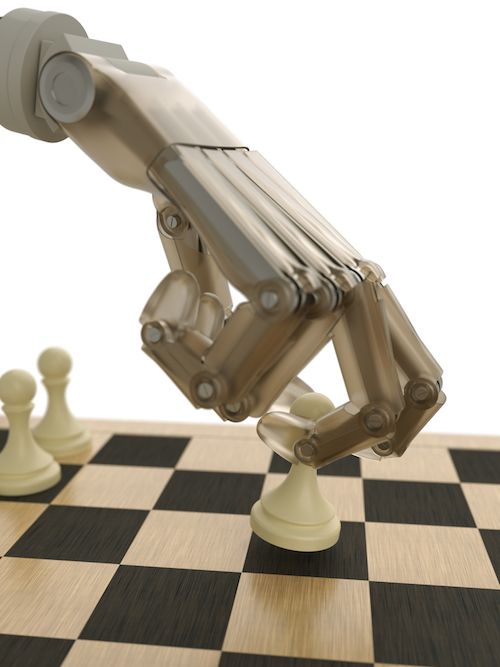
A Chess Engine Is NOT Your Friend!
Several years ago I was visiting a friend and he was online looking at live games in a team match event. One game was between a grandmaster (who had the Black pieces) and an international master.
A zillion people were using a zillion chess engines and they were all raving about how the grandmaster was in trouble.
I found this funny, since the computer only had White a tiny bit ahead. (Why is the grandmaster in trouble if the number shows only a small plus?)
I also found it funny since I was well-acquainted with that kind of pawn structure, and understood that if anyone was going to win this game, it was Black.
Under my friend’s name (since I was logged in to his profile), I mentioned that Black was for choice, and it would either be a draw or a Black victory.
A zillion people, in perfect unison, wrote, “You’re an idiot! You don’t know anything! Can’t you see that White is 0.21 ahead?”
At the time, this reminded me of a trip I took on a very hot summer day with my parents to the San Diego Zoo. I was 12 years old and was looking at a large ape, and my mother said, “Here’s a banana, give it to him.”
A sign said, “Danger! Don’t feed the animals!”

I pointed this out, but my mother insisted. “Feed the poor thing!”
So, I took the banana and slowly reached closer and closer to the ape’s hand, which was reaching out of the cage, apparently desperate for the meal I was about to give him.

Then, suddenly, the ape grabbed my wrist, screamed out crazed monkey-speak, and started pulling my hand towards his mouth, which was now wide open and filled with huge, sharp teeth!

I panicked and desperately pulled back and, fortunately, the sweat on my arm led to the ape losing his grasp on me. Later I learned that this same ape had bitten off someone’s finger.
The zillion comments reminded me of that aggressive screaming ape, and I knew that anything I said would be met with violence via another chorus of nasty derision. I told my friend to move on to another game, but he implored me to set the record straight.
So I wrote a couple of instructive paragraphs on why Black had all the chances. Sure enough, the same zillion cut me to bits. After all, any fool could see that it was 0.21, right?
So, Black played the strategy I had given to the masses, and 20 moves later White resigned. All the viewers quickly left, went to another game, and once again started to parrot their chess engine’s numbers.
I bring this up because a well-meaning reader (weski) used a computer to challenge something I said in My Favorite Classic Games, Part 12.
Starting with a key position from the game Rosenthal–Steinitz, his computer played a full 154-move game with itself, and offered up more than 3,000 moves of analysis.
In my notes, I claimed that White was “strategically lost.” I won’t get into the semantics of “lost” and “strategically lost,” and I’m not criticizing Mr. weski in any way, shape or form.
In fact, I’m thankful that he brought this up. (By the way, I still claim that White is strategically lost!)
The point of this article is to discuss something that needs to be addressed: CHESS ENGINES ARE OFTEN DETRIMENTAL TO THE CHESS HEALTH OF NON-MASTERS.

My article (My Favorite Classic Games, Part 12) was about a simple concept concerning how to make use of two bishops. Once you grasp it, it will help your game and make you a stronger player.
Simple, easy, no big deal.
Articles like this are meant to be read, pondered, and read again, until you understand the article’s point/lessons and can actually use this newfound knowledge in your own games. But, when the screaming apes (chess engines) are brought in they light up the sky as they point out a missed tactic, or give us a number showing that one side or the other is a hair better or worse than the author claimed.
And once the engine’s alarm bells go off, the innocent reader often views the concept as false, and all that he might have learned gets thrown out the window.
The engine might be right or wrong. But it distracts from the whole point of whatever lesson is being taught. And this is a terrible shame, since the lesson’s concept will help you for the rest of your chess life, while an odd number (e.g. 0.21) will be quickly forgotten.
A great example is my book, The Amateur’s Mind.

Chess engines and databases weren’t around when I wrote that book (the same goes for the early editions of How to Reassess Your Chess), and I was using pen and paper, with a chess set on the table.
As a result, the Amateur’s Mind was filled with errors. And, of course, once chess engines were a dime a dozen, the know-it-alls not only gleefully pointed this out, they claimed the book was terrible due to those mistakes.
But, that’s completely wrong. The Amateur’s Mind is an exceptionally instructive book, and like all my work, it’s about concepts that will help most amateurs improve their chess understanding.
The errors are unfortunate in that they have distracted people (thanks to chess engines) from the book’s purpose. And, once again, the people who allowed the chess engines to distract them walked away learning nothing.
So, should all books that have lots of errors be tossed into the bonfire? If that’s the case, any book written before the engine age is guilty and needs to be placed in front of a firing squad. This includes Alekhine’s brilliant books and notes, Capablanca’s comments on his own games, and on and on it goes. Take any old book or look at any old game and your chess engine will slice and dice it.
But wait! Kasparov wrote a book about his games with Karpov using computer analysis, but he decided to rewrite the book years later when computers became much stronger. And when you look at modern games between the world’s best players, computers constantly point out inaccuracies and outright blunders.
Should these games be laughed at? And though chess writers now use engines, should they rewrite their books/articles every time the engines become better and better, ad infinitum?
When I was studying chess a lot in my early teens, I learned everything from chess books and articles. Now, when I look at those same books/articles, I realize that the “big advantage for White due to whatever the subject was” was actually wrong, due to some computer tactic.
Thank god I didn’t have a chess engine to lead me to “never improve-ville,” since the lesson was learned and I became a much better player because of it.
Here’s an extremely instructive game by Fischer; but it’s not just instructive, it’s also a work of art, a thing of beauty.
For many years, Fischer’s play in this game was considered to be perfect. Fischer annotated it and thought so, and many other grandmasters and writers also annotated it and considered it to be, from White’s point of view, devoid of errors.
Though Fischer’s moves were akin to the finest of musical compositions, he botched it at the end and allowed his opponent to draw.
However, Fischer himself never knew that Black had a way to draw, nor did the endless grandmaster annotators who studied this game. It took the engine Houdini to spot the brilliant save.
Does this make the game any less beautiful, any less artistic? No, not at all.
When amateurs look at master games, the point is NOT to find errors, but to learn enough to appreciate the game’s beauty, and learn the lessons that eventually will allow you to create that same beauty in your games.
I remember playing a game vs. Fritz some years ago, and I ended up in a queen and pawn vs. queen endgame. Evidently tablebase was on too, since the computer lit up and announced (I don’t remember the exact number) something like, “Mate in 63 moves!”
Horrified, I tried to ignore this obvious ruse to distract me and played a move. It lit up again and announced, “Mate in 65 moves!”
What??? I played another move and it said, “Mate in 66 moves!”
I was going backwards! So… I turned the thing off.
Some endgame solutions run into the hundreds of moves. Yet, when you look at them, they don’t make any sense at all. And then it struck me! Perhaps the computer is pulling our combined legs! Perhaps it’s telling other engines, “Stupid carbon life forms! They will believe anything! Next time let’s try a mate in 650 and see if they believe that too!”
Sorry for my digression!
Now we’re left with an important question: Is unknowable computer chess real chess, or a form of chess that our human minds can’t comprehend? And even if titled players can understand a good deal of what computers toss our way, the masses of engine addicts can’t and never will. They enter the world of delusion by thinking they are making the machine’s moves, and by doing so, any hope they ever had of improving is stillborn.
I’ve had students that did this. They would give me their computer’s analysis of their game and I would ask, “What does this move do?”
The answer was usually silence.
And now, my recommendations for people that want to toss delusion aside and actually improve their game. Quite a few players will reject this, others will actually get mad, and others will claim that I’m wrong and they are right. That’s cool. Go for it.
As for Mr. weski, please do yourself a favor and turn off the engine. You’ll be a better player if you do.
RECOMMENDATIONS:
-
If you are not a master, or at least 2100 rated, try not to use engines in most situations.
-
If you are looking at a live game, try and figure out what’s going on all by yourself. Use it as an instructive opportunity. No engine!
-
If you play in a tournament, annotate all your games as deeply as possible. Not just moves, but your thoughts and emotions during the game. Only AFTER you do this should you have your engine look for tactical misses.
-
Don’t expect a computer to help you with anything but tactics. Will it tell you why a quiet move it recommends is good? Will it tell you what it does? No, it won’t. All it will tell you is, “0.21.” Good luck with that. Of course, it also won’t tell you how to prepare a tactic or turn a dynamic advantage into a static one.
-
All in all, a chess engine is almost useless for the amateur player. All it offers is false hope and misguided ego based on the engine’s moves, which many amateurs think are theirs. My final assessment: if you want to improve, the effect of the engine is far more negative than positive, so turn it off.
RELATED STUDY MATERIAL
- Read IM Silman's previous article: My Favorite Classic Games, Part 13.
- Watch the Chess.com video: GM Nakamura + Rybka vs Stockfish! -- Highlights.
- Take Silman's lesson on strategy in the Chess Mentor.
- Solve some puzzles in the Tactics Trainer.
- Looking for articles with deeper analysis? Try our magazine: The Master's Bulletin.






